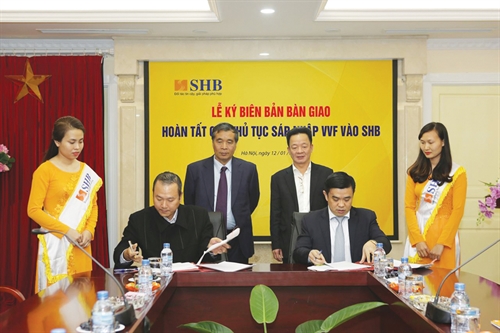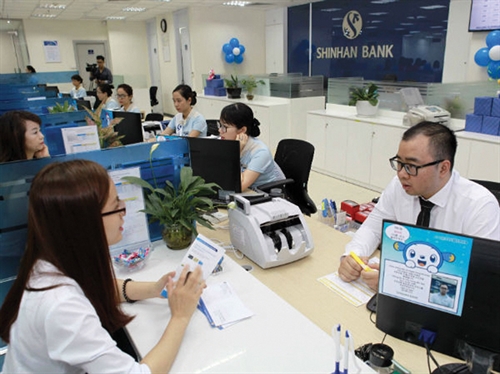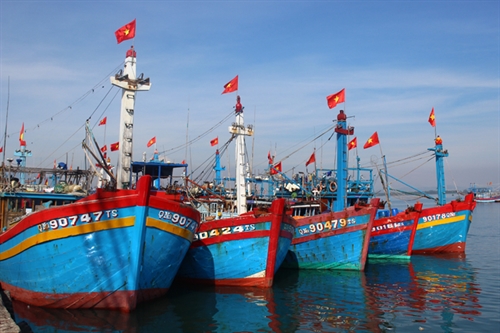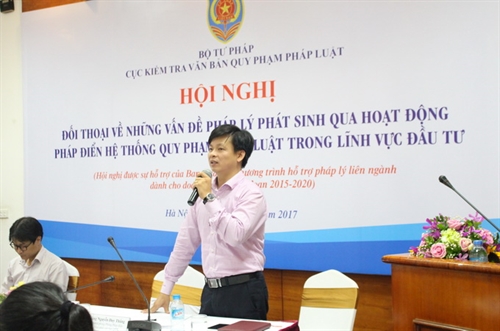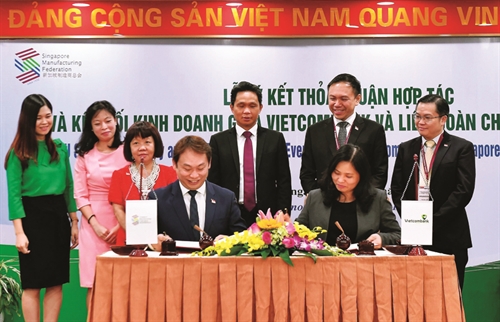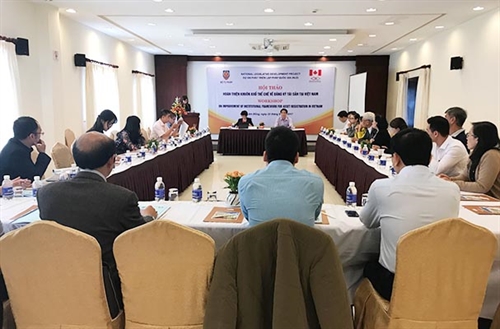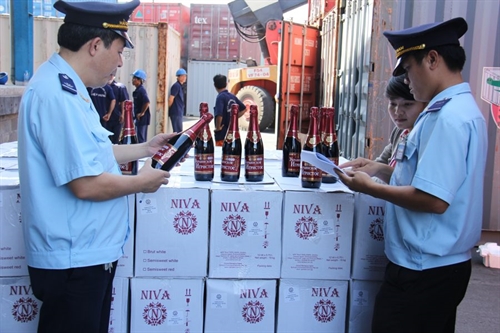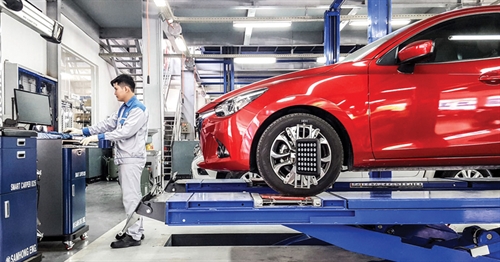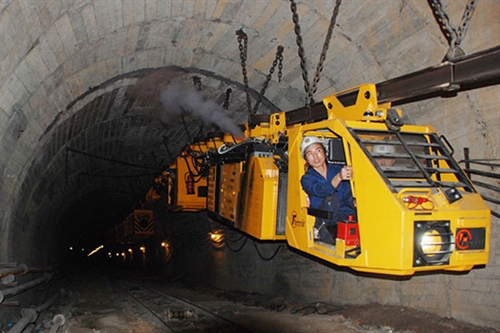Thomas G. Giglione, Tran Van Nam and Fabien Lambert[1]
Background
“A lack of awareness about the benefits of mediation leads to huge amounts of money being spent by businesses on court proceedings.” “But it is not just about financial and time costs; it’s also about relationship costs. Lengthy legal proceedings mean hundreds of thousands of broken commercial relationships,”[2] said Arnaldo Abruzzini, Secretary General of Eurochambers (the Association of European Chambers of Commerce and Industry).
The advantages of alternative dispute resolution (ADR) processes such as commercial mediation, conciliation, and arbitration over litigation are numerous. Disputing parties can expect to benefit from less costly and much faster process, with commercial proceedings seldom taking longer than a week, the ability to maintain amicable relationships with one another (and save face), and full confidentiality in the process.[3] The legislative basis for mediation is noted to improve and countries, such as Vietnam, have pursued mediation reforms as a response to contemporary demands.[4]
The impact of ADR in resolving commercial disputes and releasing funds into the economy for real growth is undeniable. The benefits of ADR can be summarized into three broad categories, as shown in the figure below.[5]
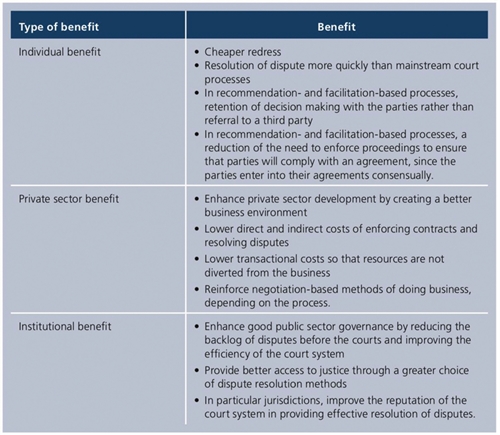 |
| Source: Investment Climate Advisory Services of the World Bank Group, Alternative Dispute Resolution Center Manual: A Guide for Practitioners on Establishing and Managing ADR Centers, Chapter 1, pp. 4-5 |
Furthermore, Figure 2 shows an evaluation, which focuses on whether or not a complete settlement is achieved earlier in the litigation process through mediation under the Mandatory Mediation Program in Ontario, Canada. The main findings are that in both Ottawa and Toronto, a significant proportion of cases about four out of every ten are completely settled at or within seven days of mediation.[6]
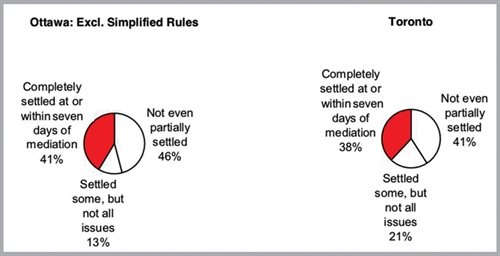 |
| Source: Report from Canadian Mediation Program, Chapter 1, p. 11 |
In addition, Southeast Asia will be the next major boom market for e-commerce in the Asia-Pacific region. The Asia-Pacific region accounted for 40 percent of global e-commerce sales in the first quarter of 2017, but the vast majority of those sales went to larger or more mature markets in the region, particularly China, but also Japan, Australia, South Korea and India. That leaves Southeast Asia as the next frontier for e-commerce in the region.[7] (See Figure 3)
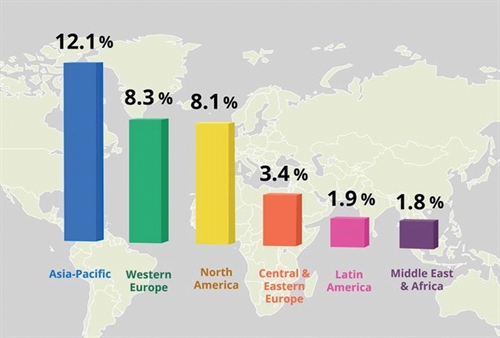 |
| Source: eMarketer, August; as cited in the report “Asia-Pacific B2C E-Commerce Market 2017” |
Regional overview
Commercial mediation is gaining more acceptance and importance in the Asia-Pacific region. The Singapore Government and Singapore International Arbitration Center (SIAC) appear to be taking the lead role by pioneering more efficient judicial proceedings that allow parties to choose alternative dispute resolution processes. SIAC introduced hybrid models of resolving disputes through alternative dispute resolution mechanisms such as the Arb-Med Arb Protocol. This AMA Protocol applies to all disputes submitted to the SIAC for resolution under the Singapore Arb-Med-Arb Clause or other similar clause (AMA Clause) and any dispute which parties have agreed to submit for resolution under this AMA Protocol. Under the AMA Protocol, parties agree that any dispute settled in the course of the mediation at the Singapore International Mediation Center (SIMC) shall fall within the scope of their arbitration agreement.[8] Indeed, many legal systems in this region are improving their commercial mediation legal framework to make it not only an alternative dispute resolution means suitable for economic players, but a real opportunity for them by avoiding the inconvenience of public courts and keeping good relationships with their commercial partners. This is especially important where a manufacturer would want to maintain a good relationship with their suppliers and dealerships long after their dispute is resolved. Mediation allows for a “win-win” outcome where both parties interests are addressed in contrast to a “win-lose” outcome where one party recovers costs in a lengthy litigation process.
Alternative dispute resolution in Vietnam
Mediation, an alternative dispute resolution mechanism, has just been introduced into the legal system of Vietnam.
2010 Law on Commercial Arbitration
According to Article 9 of Law 54/2010/QH12 on Commercial Arbitration (the 2010 Law on Commercial Arbitration - LCA), parties shall have the freedom, during the process of arbitration proceedings, to negotiate and reach agreement with each other to resolve their disputes or to request the arbitration tribunal to mediate in order for the parties to reach agreement and resolve their dispute. Furthermore, if the parties reach a settlement agreement through mediation conducted by the arbitration tribunal, the arbitration tribunal shall issue a decision recognizing the agreement of the parties, which have the same validity as the arbitral award.
Arbitration is internationally recognized as an efficient way to obtain a swift resolution of conflicts, especially when it comes to technical matters. Less costly than court proceedings, it is a necessity for businesses, especially small- and medium-sized enterprises (SMEs). It is particularly adapted to international disputes due to the fact that the parties involved are of different nationalities, speak different languages, and have different legal and cultural backgrounds. The flexibility offered by arbitration procedures allows to solve language problems and is reassuring to foreign investors as they can resort to the judicial system they are familiar with. Developing arbitration in Vietnam would foster foreign investors’ confidence in doing business in Vietnam.[9]
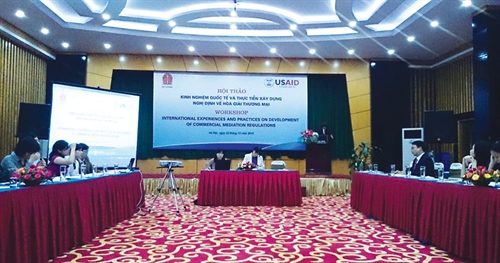 |
| Workshop on international experiences and practices on development of commercial mediation regulations in Hanoi __Photo: Internet |
The 2015 Civil Procedure Code
Civil Procedure Code 92/2015/QH13 dated November 25, 2015 (the 2015 Civil Procedure Code) replacing the 2004 Civil Procedure Code, has recognized the jurisdiction of the court in the settlement of disputes on investment, business and commerce.
Also, the 2015 Civil Procedure Code added a new chapter regarding the recognition results of out-of-court mediation (mediated settlement agreement). Accordingly, one party or both parties to the mediated settlement agreement can apply to the court for the recognition of their agreement. Once recognized, the mediated settlement agreement is enforceable as a full and final court judgment in compliance with Vietnam’s Law on Enforcement of Civil Judgments.
Decree 22 on commercial mediation
On February 24, 2017, the Government of Vietnam issued Decree 22/2017/ND-CP (Decree 22) on commercial mediation, which comes into effect on April 15, 2017. It is the first legislation specifically governing commercial mediation and creates a legal framework for the development of commercial mediation in Vietnam. Decree 22 provides the principles, conditions, and procedures of commercial mediation as an alternative dispute resolution method, thus creating the conditions for the establishment of mediation centers in Vietnam. Per Decree 22, commercial mediation is applied to (i) a dispute between parties practicing commercial activities; (ii) a dispute between parties with at least one party practicing commercial activities or (iii) a dispute which under law can be resolved by commercial mediation.[10] Decree 22 stipulates that mediation shall only apply to disputes of commercial nature or disputes in which at least one party is engaged in the commercial activity or disputes specifically designated by other laws to be settled by commercial mediation. The Decree defines “commercial activities” as activities for the purpose of generating profits, including purchase and sale of goods, provision of services, investment, and commercial promotion.
Defining a mediator and the mediation process:
According to Decree 22, commercial mediators include ad-hoc commercial mediators and mediators from commercial mediation institutions selected by the parties or appointed by a commercial mediation institution at the request of disputing parties.[11] Apart from general moral standards, mediators must have a university or higher qualification and at least two years of working experience in their educated discipline. Mediators are required to have mediation skills as well as legal understanding, knowledge of business and commercial practice. To coincide with these specific and arguably strict requirements, the Decree lacks an accreditation system to train meditators.[12] Arguably, in some situations, the requirements of a mediator set out in the Decree hinder the advancement of mediation practice. Although there is no explicit restriction on the nationality of mediators, the Decree imposes a technical barrier requiring ad-hoc mediators to register with the provincial Department of Justice of the locality where they reside. As a result, the opportunity for foreign mediators to personally practice in Vietnam may be restricted. The selection of a qualified mediator may be a tough job for disputing parties as well as their counsel since the persons meeting the requirements of Vietnamese law may not be as skillful and experienced as internationally accredited mediators.
Selecting a mediator:
Disputing parties are entitled to choose the mediation rules of a commercial mediation institution or agree on their own mediation procedures. Where the parties have no agreement on the order and procedures for mediation, commercial mediators shall conduct the mediation how they, the mediators, find appropriate to the content of the dispute and in the best interest of the parties. Choosing procedures for mediation from the onset is critical as it determines all aspects of the mediation process, such as appointing a mediator, mediation steps, mediation fees, enforcement of settlement mediation agreement and other related matters.
Eu-Vietnam free trade agreement (EVFTA)
The EVFTA includes trade facilitation and enhancement instruments, ranging from Customs and Trade Facilitation, to Rules of Origin, Geographical Indications, Bilateral Dispute Settlement, Investment Protection, and Intellectual Property Rights protection principles.
Latest simulation results by economic experts of the European Trade Policy and Investment Support Project (MUTRAP )
suggest that Vietnam is expected to gain significantly from bilateral trade liberalization with the EU. In terms of national income, the Vietnamese economy is estimated to be 2.5 percent, 4.6 percent and 4.3 percent larger respectively in 2020, 2025, and 2030 than would be the case in the absence of the reforms under the EVFTA. These increases are over and above the growth that would occur in the absence of these policy changes.[13]
The EVFTA constitutes important legal developments and dedicates a considerable role in the mediation of both state-state and investor-state disputes in Vietnam.[14] As per the free trade agreement, Vietnam and the EU have agreed on a modern and reformed investment dispute resolution mechanism, which guarantees the respect of the substantive investment protection rules applicable to European and Vietnamese investors[15].
Under the EVFTA, at any time during the settlement of an investor-state dispute, any disputing party can invite the other party to conduct mediation by the procedure stipulated therein. The specific regulations on mediation included in the EVFTA demonstrate the special attention given by the legislators in Europe and Vietnam to dispute resolution through mediation, which is apparently gradually becoming a favorable new trend in the world. Consequently, we believe that this trend will also positively affect and further help the development of commercial mediation in Vietnam.[16]
Current obstacles to the development of ADR in Vietnam
Although the resolution of disputes by mediation gradually becomes a trend because of the awareness of Decree 22, in the legal community, however, the use of ADR mechanism for commercial disputes in Vietnam still faces some difficulties and obstacles.
As mediation is very new in Vietnam, the number of lawyers specializing in mediation procedures is extremely limited. The success of the mediation process depends on the selection of rules and procedures for mediation and mediators. There is no formal accreditation for mediation, conciliation or arbitration in Vietnam. Therefore, it is necessary to design and conduct more alternative dispute training courses on mediation, conciliation and arbitration to add credibility to the process. Very few commercial contracts in Vietnam lack ADR clauses that allow parties to automatically move to alternative dispute resolution mechanisms such as mediation and conciliation should a contractual dispute arise.
Decree 22 provides a framework and specific guidelines to facilitate the parties to use mediation to resolve their disputes. The law on commercial mediation is still incomplete and incompatible with some international commitments. Notably, this is also the case with arbitration in Vietnam. It is recorded that foreign investors often opt for alternative dispute resolution mechanisms to avoid using the Vietnamese courts to settle their disputes.[17]
Mediation is a very new way of resolving commercial disputes in Vietnam. However, lawmakers do not really distinguish the fundamental rules that distinguish between mediation, conciliation, and arbitration and binding a non-binding negotiation in the wording of the Decree. The wording in Decree 22 is nebulous and requires elaboration or creates confusion for all those concerned. The most crucial aspect of the mediation or conciliation process is confidentiality. There is no provision in Decree 22 to guarantee confidentiality of the mediation or conciliation proceedings and no protection from the court that the mediator or conciliator will not be subpoenaed to the court during future proceedings thus nullifying the mediation agreement signed by the mediator/conciliator and the affected parties.
Although the Decree is expected to create a legal framework that facilitates the development of mediation, some points are not compatible with international law. First, it is required that the mediator be registered with the provincial Department of Justice, which is a technical barrier that prevents the choice of a foreign mediator to participate in the mediation of disputes in Vietnam. This is a limiting point, especially with international commercial disputes since the human resources specializing in this field are limited in Vietnam. Second, Vietnamese law also lacks some provisions on the use of evidence in mediation for other proceedings. These shortcomings will make the parties hesitate in using mediation to resolve disputes.
Therefore, mediation in its current form may not be a viable choice to the disputing parties. It is recommended selecting mediation or conciliation for resolution of commercial disputes, choose the international. It is therefore advisable to use UNICITRAL mediation rules with added supplementary provisions to make up for the shortcomings of Decree 22 to increase the chance of success of the mediation process.
Recommendations for the development of ADR in Vietnam
Influenced by the LCA and in conformity with the commitments of Vietnam to the World Trade Organization, Decree 22 also encourages foreign mediation institutions to open branches or representative offices in Vietnam. Furthermore, the branches of international mediation centers can establish their own panels of mediators provided that the mediators meet the general qualifications specified by Decree 22. It was anticipated that these regulations would encourage international mediation centers to explore the Vietnamese mediation market.[18]
There are other positive trends to create more awareness of ADR processes for the legal community and the public and promote the use of ADR in the region. One example of this are annual ADR conferences, such as the 2017 Asia-Pacific Mediation Forum Conference which was held in Da Nang on November 11-13, 2017.[19] This type of public discourses are a real opportunity for the legal community including entrepreneurs and academics to learn more about alternative dispute resolution processes to create an awareness in the region about the efficiency of ADR.[20]
Decree 22 allows for the creation of private mediation centers. There is one very recent development in the UK of a business chamber creating a mediation center as a benefit for its members. A public and private partnership was created by ProMediate, a private company founded by a judge in the UK which developed a service under the auspices of the Greater Manchester Chamber of Commerce whereby members could refer disputes to mediation thus saving members on legal fees by resolving disputes early and before court fees are incurred. This collaboration between business chambers and the private sector to create mediation centers has proven to be very successful, and they receive many inquiries from not only businesses but the public about using the service. ProMediate also offers mediation for all consumers and business disputes in the UK under an ADR Directive offering mediation by telephone and online. It is always flexible about the methods of mediation rather than insisting on a full day’s mediation in many cases about disputes between law firms and their clients.[21]
The creation of an ADR center in Vietnam that offers both online and under the auspices of business chambers would include the input of their legal subcommittee.[22] Creating a high-quality mediation service center where members can refer disputes for mediation conciliation or arbitration, thus resolving disputes before the legal route is pursued.
These recommendations would improve professional development and awareness not only for the legal community in Vietnam but also for the public.
Public and private awareness of ADR including the establishment of mediation centers will create more viable options for all stakeholders and, as a result, an improved system for greater access to justice for the private sector and the people of Vietnam.-
Tran Van Nam, Assoc. Professor, Ph.D, Vietnam International Aribitration Center
Fabien Lambert, Research Associate, Vietnam National University
Available at <https://arbitrationblog.kluwerarbitration.com/2017/07/02/deposition-japan-u-s-based-international-arbitration/> [last accessed September 27, 2017]
